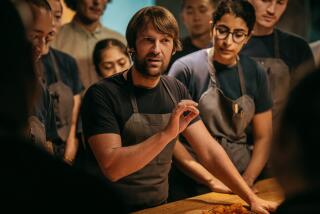A Veggie Plan Sets the Stage for Readers’ Ire
My confession that I am giving up eating animals by stages--that is, I have given up scallops, oysters, snails and all the other invertebrates, but not little pig sausages or Dodger Dogs--has angered at least one reader.
“I am all for humor in daily life,” writes Peggy Wirta Dahl of Santa Barbara, “but I feel you acted in an irresponsible manner regarding this issue.”
Dahl encloses an article by John Robbins from the Animals’ Voice magazine that contains some really dreadful statistics. In a plea for Americans to switch their diet from meat to vegetables, Robbins says that eating meat accelerates the greenhouse effect, the erosion of topsoil, the decimation of forests and habitats, the widening hole in the ozone layer, the pollution of air, water and soil, and “the tidal wave of (species) extinction sweeping over the globe.”
He says that livestock consume 80% of the corn, 95% of the oats and almost all of the soybeans grown in the United States--enough to feed more than five times the entire population. “If Americans were to reduce their meat consumption by only 10%, it would free over 12 million tons of grain annually. . . . That would be enough to adequately feed every one of the 60 million human beings who will starve to death on the planet this year.”
OK. If we gave up meat only one day a week, that would be more than 10%. I’m willing to do that to help feed 60 million people, and I’m not kidding.
Robbins’ main complaint is against the destruction of forests and topsoil for the growing of livestock feed. “We don’t realize that in every Big Mac there is a piece of the tropical rain forests, and with every billion burgers sold another hundred species become extinct.”
I suppose that includes grain for chickens, but what about fish? If we all switched to fish would the seas soon be depleted? I tend to eat more and more fish, but I wouldn’t want to be responsible for the elimination of all edible piscatorial species.
Of course there are vegetarians who deplore fish eating, as well as meat eating, but as I pointed out in my previous column, “Was Jesus not a fisherman?”
Several readers have written to advise me that Jesus was not a fisherman. “He was a carpenter (Mark 6:3),” writes Mark E. DeVries of Pasadena. “He was, however, reported to have assisted his disciples with their fishing (John 21:6) and he ate fish, no doubt, which was your point to begin with.”
Mark 6:3: “Is not this the carpenter, the son of Mary? . . .”
I believe that is the only reference in the Gospels to Jesus as a carpenter. However, the question is confused by Matthew 13:55: “Is not this the carpenter’s son? Is not his mother called Mary?”
In his book “Jesus Son of Man,” Rudolf Augstein says, “It seems to be an old tradition that Jesus was a carpenter or the son of a carpenter . . . and there is no objection to this, except that he was possibly not a carpenter at all. In those days there was certainly a saying, ‘Is there a carpenter or a carpenter’s son among us?’ ”
There is a lot more evidence, it seems to me, that Jesus was a fisherman. Consider John 21:6: “And he said unto them (the unsuccessful fishermen), ‘Cast the net on the right side of the boat, and ye shall find.’ They cast therefore, and now they were not able to draw it for the multitude of fish.”
Also, there is the miracle in Luke where Jesus takes five loaves of bread and two fishes and converts them into enough bread and fishes to feed 5,000 men.
Now that’s fishing.
Even if Jesus was a carpenter, perhaps trained by his father, there is no evidence that he ever made anything or repaired anything. He devoted himself entirely, it seems, to his ministry. But he must have fished as a boy, to help put food on his family’s table.
In any case, I have no doubt that fish was a staple of his diet. One of the earliest Christian paintings of the Last Supper shows Jesus and the disciples sitting around a table on which two large fish lie on a plate.
I doubt that there is anything in Scripture, however, to justify my taste for Dodger Dogs.






